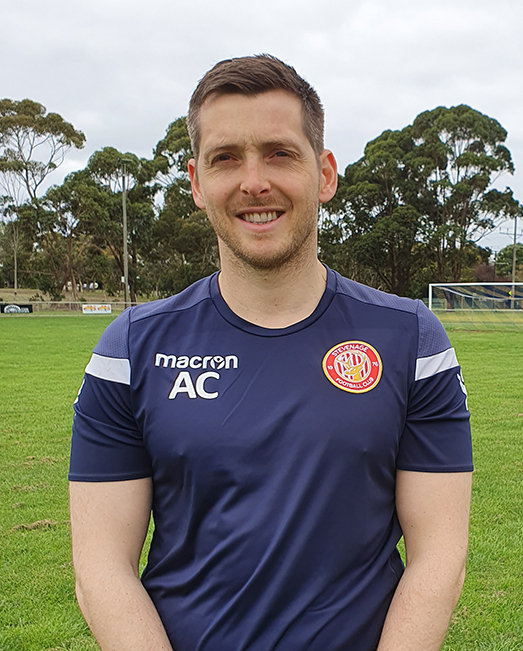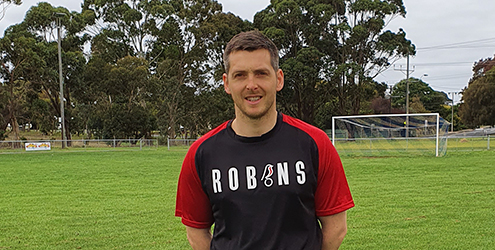Career
Copyright@ Australian Catholic University 1998-2026 | ABN 15 050 192 660 CRICOS registered provider: 00004G | PRV12008
Copyright@ Australian Catholic University 1998-2026 | ABN 15 050 192 660 CRICOS registered provider: 00004G | PRV12008

When Andrew Costin moved to the other side of the world to pursue his dream of working in English football, he took a big step towards overcoming his fear of rejection. But after six months in the Old Dart, he began to feel a slight hint of dread creeping up on him.
“I left my comfort zone in Australia to come up here and give it my best shot,” says the 31-year-old sport scientist, who was midway through his online Master of High Performance Sport (MHPS) with ACU in December 2018 when he landed in football’s spiritual home.
Over the following year, Andy — a dual Australian and British citizen —approached almost 40 English football clubs to apply for an internship. Not one of them responded positively.
“It was a lot of rejection, and even though you expect that when you’re starting out, it was still tough to take,” he says.
“But I think you have to be willing to accept failure, and willing to accept rejection, because without that willingness you’d just never put yourself out there.”
He shrugged off the disappointment and marched on with his studies while continuing to approach professional clubs, finally scoring an internship with Division Two outfit Stevenage, whose assistant manager Mark Sampson ultimately hired him as the club’s head of sport science.
“Mark stressed to me the importance of networking in the sport business,” Andy says. “He told me I need to make contacts and reach out to anyone I have access to, and I’ve always heeded that advice.”
It was at a guest lecture in the MHPS program that Andy first came across Ben Ashworth, performance scientist with top-flight English Premier League club Arsenal
“After the lecture, Ben said to us students, ‘Here’s my email, and if anyone wants to ask a question or reach out for advice, just go for it’.”
When Ashworth moved to Prague to work with AC Sparta, Andy took the opportunity to reach out, eventually flying to the Czech Republic to spend some time observing the club’s processes.
“Ben was super helpful and really interesting to talk to, and he said to me, ‘Keep grinding away and the opportunities will come to you … and keep making contacts’.”
On his return to Stevenage in early 2020, with his master’s degree almost finished, Andy fielded a phone call from Bristol City FC, a high-performing club in the English Football League (EFL).

“I knew Bristol was a big club and everyone in football speaks of them in the highest regard, so it was a real surprise when was a guy named Andrew Rolls called to set up a meeting,” Andy says.
“I thought, ‘I wonder why he’s calling me’ … and I quickly worked out that he used to work at Arsenal with Ben Ashworth.”
Clearly impressed with Andy’s knowledge and enthusiasm, Ashworth had no qualms recommending him to Bristol City, who were equally impressed, and after a gruelling interview, they offered him a job as the club’s physical performance analyst.
“I was shocked — pleasantly shocked — and very humbled,” Andy says.
“I’m just some Australian kid who’s starting out in the industry, and all of a sudden this big and successful EFL club is interested in me and seeing value in my ideas.
“If you had told me last year, ‘Oh, you’re going to get rejected by 30-plus football clubs ... but by March, you’ll be working in the Championship’, I just wouldn’t have believed you’.”
Andy didn’t always aspire to be a sport scientist.
Originally trained as a PE teacher, he went on to juggle full-time teaching with a coaching job at a regional sporting academy in Mount Gambier, while also studying educational leadership at ACU.
“It just kind of dawned on me, here I am working at this sporting academy a few hours a week, and I love it a lot more than my job where I’m spending most of my time,” he says.
“I realised it was the sport aspect that I was passionate about, and I needed to give myself the best opportunity to succeed in sport. That’s when I decided to enrol in the MHPS course at ACU.”
He went into the degree with strong ideas about what it meant to be a sport scientist; most of which were quickly turned on their head.
“I’ve always been really strong on the tactical aspects of sport, and I guess I thought sport science was all about analysing team tactics,” Andy says.
“But what I’ve learnt while doing the course is, no matter how much you have prepared the athlete in a tactical and physical sense, you need to also pay attention to mental preparation, and when it comes to optimizing an athlete's performance, an individual approach is just crucial.
“I think that’s where sports science is heading, and I find it really exciting to be immersed in that world with a professional football club.”
As for Bristol, Andy has some big goals to achieve at his new club.
“From a team perspective, I’d love to play a role in helping the club to gain promotion to the Premier League — that would be a fantastic achievement for everyone,” he says.
“But the main thing for me is to continue to make meaningful and beneficial relationships with the athletes, to continue to learn from those at the club and in the industry, and to continue to face my fears.
“I don’t believe there is such a thing as failure — it’s just an opportunity to learn and grow. And when you flip your mindset to face your fears, you move outside your comfort zone and learn new things, and that’s beneficial to your professional growth, but also to your growth as a person.”
Keen to study sport and exercise science at ACU? Explore the options.
Copyright@ Australian Catholic University 1998-2026 | ABN 15 050 192 660 CRICOS registered provider: 00004G | PRV12008